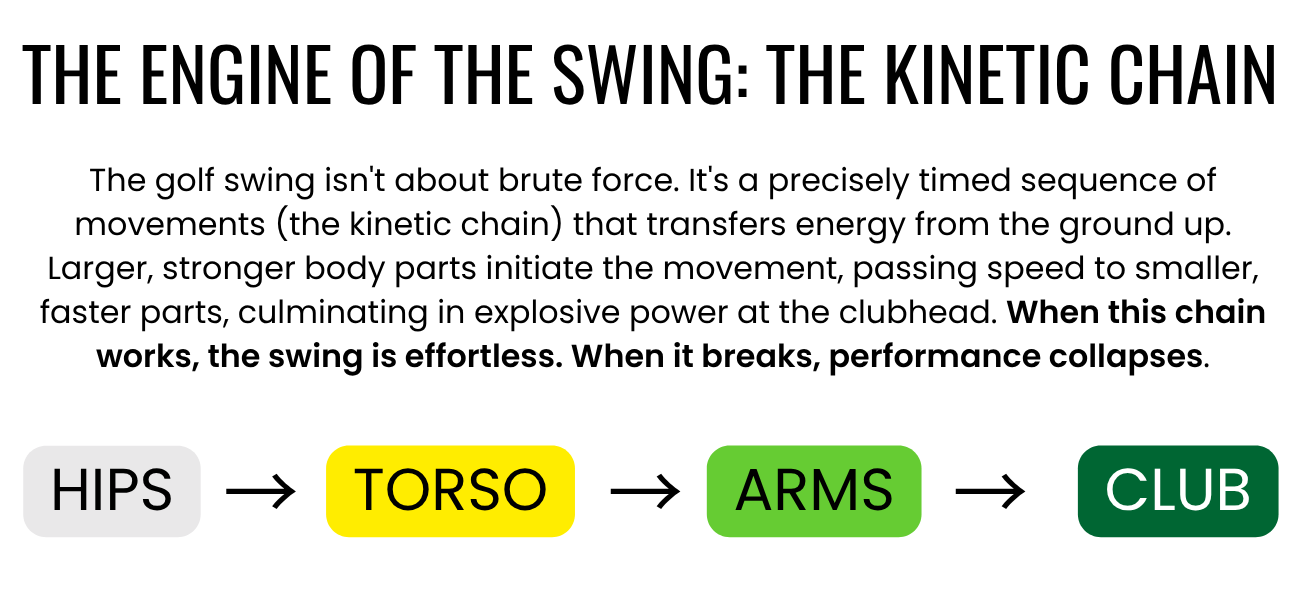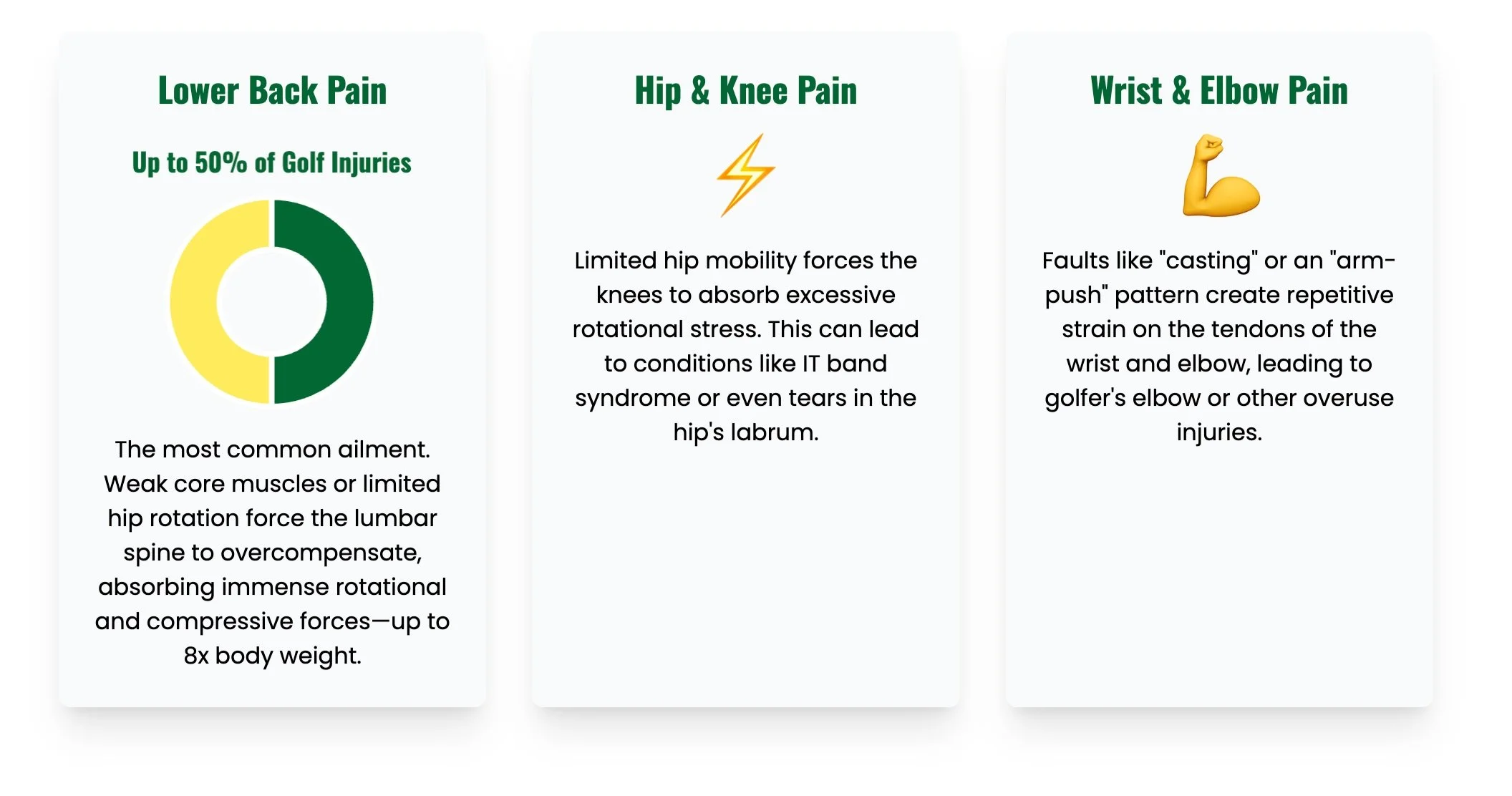Why Most Golfers Struggle (and How the Split Hand Throw Fixes It)
The case for a kinetic chain reset in your swing.
If you’ve ever felt like your golf swing takes more effort than it should…
If your shots are inconsistent; some slicing, some pulling, some going nowhere…
Or if you’ve got nagging aches in your back, hips, or wrists after a round...
You’re likely suffering from a dysfunctional kinetic chain.
That’s a fancy way of saying: your body segments aren’t working together the way they’re supposed to. And when the sequence is off, everything goes sideways…literally and figuratively.
Here’s the good news: the Split Hand Throw Squaring Routine (yep, that underhand throwing motion we talk about all the time) does exactly what your body wants to do naturally. It gets your kinetic chain back in sync, without you having to micromanage each body part.
Let’s break down why that matters.
The Kinetic Chain: Your Body’s Internal Power System
The kinetic chain is how force travels through your body during a golf swing. It starts from the ground up:
Feet stay planted
Hips initiate rotational movement
Torso follows
Arms and hands accelerate and provide direction for the
clubClubhead whips through last, at max speed
When this sequence happens in order, power flows like a wave. You get clubhead speed, clean contact, and accuracy, all with less strain.
But when the chain is broken (say, the arms take over too early, or the hips slide instead of rotate) you start leaking energy, creating compensations, and setting yourself up for both swing faults and injury.
The Performance Gap: Pro vs. Amateur
The data is undeniable. The primary difference between professional and amateur golfers lies in the efficiency of their kinetic chain. Professionals generate vastly more speed and transfer energy more effectively between body segments, leading to a massive performance advantage.
How Swing Breakdowns Happen
Here are just a few of the most common symptoms of kinetic chain dysfunction:
“Arm push” or early release: You force the club through impact with your arms instead of transferring energy from the hips and torso. Result? Weak shots and poor clubface control.
“Muscling up”: You try to swing harder instead of swinging smarter. Tense, tight muscles block the smooth flow of energy and reduce speed.
“Hip slide”: Your hips move laterally, not rotationally. This wrecks your timing and can send the ball in just about any direction, except where you intended.
Compensations everywhere: Limited mobility in your hips, thoracic spine, or shoulders? Weak core? Your body will find a workaround, but it’ll usually involve overuse, poor sequencing, and eventual injury.
Bottom line: when your kinetic chain is off, no swing tip or training aid in the world will magically fix your consistency, distance, or accuracy.
Unless… that swing tip resets your kinetic chain.
Why the Split Hand Throw Works
Here’s where the Split Hand Throw Squaring Routine changes the game.
It teaches your body (through feel, not thought) what it’s like to properly use the full kinetic chain in the right sequence.
That’s why we start with an underhand motion. That familiar, natural throwing pattern taps into movements you already know from tossing a baseball or skipping a stone that occur automatically without having to think about them .
It reinforces a proper ground-up flow: legs → hips → torso → arms → hands → club.
The feel of the throw locks in:
The deceleration of the pelvis before impact (crucial for power transfer)
The timing of each segment’s peak speed
The release of the clubface square to the ball in play at exactly the right moment, not too early, not too late
In short, it syncs the entire swing. No more overthinking. No more trying to “create lag” or “hold your angle” or “stay behind the ball.” Your body just knows what to do, because it’s following a natural, intuitive pattern of an underhand throw.
Use the Split Hand Throw as your pre-shot routine so it immediately becomes your actual synchronized swing.
What the Research Confirms
The science backs this up. A recent review on the kinetic chain in golf showed that:
Amateur golfers have less consistent sequencing and lower rotational speeds than pros.
They tend to “muscle” the swing or rely too much on their arms, leading to less distance, more inconsistency, and higher injury rates.
Professionals achieve that smooth, powerful swing by efficiently transferring energy up the chain with minimal wasted motion.
And here’s the kicker: the exact movement patterns that protect you from injury (proper sequencing, efficient transfer, and segmental deceleration) are the same ones that maximize performance.
Which means: when you throw like an athlete (Split Hand-style), you swing like one, too.
The Physical Toll: A Cascade of Injuries
An inefficient swing isn't just bad for your scorecard; it's bad for your body. Compensatory movements and repetitive stress from a broken kinetic chain are a leading cause of golf-related injuries.
Train the Chain, Not Just the Club
Most golf instruction focuses on external cues: grip, takeaway, swing plane, shoulder turn. And while those can help, they often don’t fix the underlying issue: your kinetic chain isn’t synced.
The Split Hand Throw Squaring Routine rewires that from the inside out.
It’s not about looking better, it’s about moving better.
It’s not about controlling positions, it’s about producing results.
More speed. More accuracy. Less pain. And fewer “What did I do wrong on that one?” moments
It's about squaring the clubface to the ball at impact for center face hits that ensure accuracy and distance for all clubs and every shot.
Final Thoughts
If your swing feels inconsistent, inefficient, or just plain hard… it’s probably not your talent, mindset, or equipment. It’s your kinetic chain.
And the solution isn’t more complexity, it’s simplicity done well.
The Split Hand Throw Squaring Routine shows your body how to swing like a pro by syncing the movements you already know. It trains your sequencing, sharpens your feel, and helps you square the club more consistently producing center face hits which ensure both accuracy and distance.
Because when the chain is right, everything else falls into place.
Let’s get you swinging like an athlete again transferring an underhand throw you already know into a synchronized golf swing.










